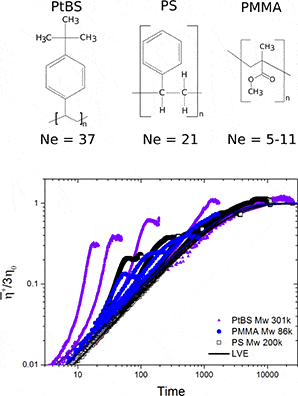Effect of Finite Extensibility on Nonlinear Extensional Rheology of Polymer Melts

Abstract
We recently showed that two systems have the same nonlinear flow dynamics if they have (1) the same number of entanglements, Z, (2) the same number of Kuhn segments between entanglements, Ne, and (3) a single monomeric friction reduction between all species. Because differences in polymer chemistry result in different values of (1)–(3), these results show that the likelihood of two melts having the same nonlinear behavior is improbable. This work determines the dependence of the nonlinear extensional flow behavior on Ne for three polymer melts: polystyrene, poly(methyl methacrylate), and poly(tert-butylstyrene). We show that polymer melts with the same Z have almost identical scaled linear viscoelasticity. Extensional rheology at constant strain rate shows strain hardening depends strongly on the value of Ne. More specifically, our data suggest a power-law dependence of steady state stress on the Weissenberg number which increases with increasing Ne.
Publication Metadata
Authors
Morelly, Samantha L.; Palmese, Luisa; Watanabe, Hiroshi; Alvarez, Nicolas J.
Keywords
Citation
Samantha L. Morelly, Luisa Palmese, Hiroshi Watanabe, Nicolas J. Alvarez. Effect of Finite Extensibility on Nonlinear Extensional Rheology of Polymer Melts. Macromolecules. 2019 52(3): 915-922. DOI: 10.1021/acs.macromol.8b02319
